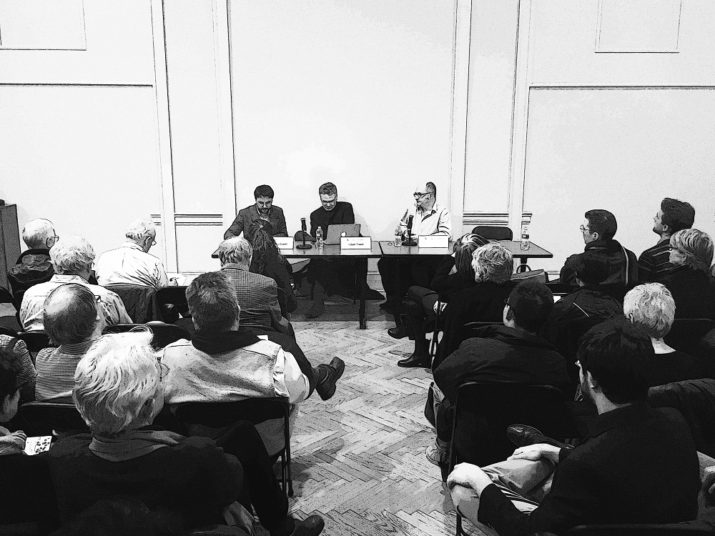

On December 1 and 2, Columbia University hosted Brexit: Before & Beyond, a set of panels and events that brought together journalists and scholars from both European and American universities to discuss the events that precipitated the UK’s vote to leave the EU, as well as the continuing fallout from that referendum. The workshop kicked off with a conversation among several historians of Europe, and British journalist and novelist John Lanchester.
Susan Pedersen, Morris Professor of History at Columbia and a specialist in modern Britain, introduced the panelists and the event. Picking up the thread of an earlier Brexit conversation in Columbia’s History Department, she noted that we all knew the Brexit vote was significant, but one of the tasks moving forward would be to determine how it was significant. Moderator Sam Wetherell, Lecturer in British History at Columbia, then provided some additional background on the event itself. Brexit at first had appeared to be an earthquake, Sam said, but now appeared to be something more of a foreshock, followed as it was by the election of Donald Trump in the U.S. (any mention of Trump sent a quiet groan through the room) and the serious possibility that far-right leaders may be elected in France, for example. He pointed out that, beyond the political reshuffling in Britain and some economic indicators (the drop in the pound, the loss of Britain’s AAA bond rating), it was unclear what the long-term consequences might be. In particular, Sam noted that it was difficult to tell what the outcome might be for Europe as a whole. Was there a “planetary revolt against globalism,” an ironically interconnected one, that would put the European project on hold?
In the ensuing conversation between John and Adam Tooze, who is the Kathryn and Shelby Cullom Davis Professor of History at Columbia, the primary topics were how much to read into Brexit and how the vote would affect Europe. Both participants were committed to questioning the extent to which Brexit marks an actually revolution. It is not so much that the potential outcomes might be meager, but both Adam and John resisted the idea that the success of the Leave campaign had anything to do with political insight, rather than sheer incompetence.
It is not so much that the potential outcomes might be meager, but both Adam and John resisted the idea that the success of the Leave campaign had anything to do with political insight, rather than sheer incompetence.
In addition, Adam in particular was hesitant to connect the Leave vote to any broader trends of illiberal populism or resistance to globalism. John also noted that the vote perhaps ought not to be so surprising, given the U.K.’s long past of neoliberal policies, which surely would have worked by now if they were going to improve the middle class.
“Overdignify” somehow became the word of the evening, and the audience was cautioned against “overdignifying” conservative politicians, the Leave campaign, and in particular the economic vision encapsulated in the Brexit vote. John thought the vote was an “inchoate protest” against neoliberalism that lacked a positive vision. Adam said that any economic vision he could discern was simply a rehash of the supply-side economics peddled by Patrick Minford since the 80s, which pointed to the long continuity behind the attitudes and political forces that yielded Brexit. Both agreed that, even if Brexit contained a negative economic argument rather than a positive one, that negative argument freed space for Theresa May’s political platform and for a politics built around a specific idea of national sovereignty as something that can be reclaimed.
A question about English identity moved the conversation to the relationship between Britain and the European Union. Sam noted that, returning to the UK every summer for the last eight years, he’d noted an increase in the number of Union Jacks he saw around, and he wanted to know if there was any basis to this. John added that most people born in the UK do not identify as British, though often immigrants or those raise abroad do. Instead, there does seem to be an increase in specifically English nationalism, but the reasons remain unclear. Adam said that in a very impressionistic way he thought this nationalist moment was related to the disappearance of national decline as a key cultural trope sometime in the 90s, with the increase in self-confidence in England and England’s role in the global economy, especially as London in particular became hip and cool, an independent hub and an actor on the global stage.
But how will the rest of Europe respond to England’s new sense of its own role relative to Europe and the world?
But how will the rest of Europe respond to England’s new sense of its own role relative to Europe and the world? Adam and John both thought that a “hard Brexit” was most likely, with Theresa May claiming a mandate and the E.U. likely wanting to make leaving as unpleasant as possible for Britain to discourage other countries from rethinking their relationship to the project. John pointed out that a key lie of the Leave campaign was the idea that capital could continue to move freely between Britain and the E.U. while labor wouldn’t. If the E.U. can successfully demonstrate that capital and labor move together in the economic system, which would simply mean enforcing the terms of a “hard Brexit,” then Britain could be seen to lose out, economically. This move wouldn’t necessarily be seen as the E.U. punishing Britain, since the former could claim that it was simply fulfilling the terms of its agreements. Adam went further, suggesting that, if the European Union wanted to be serious about being a indissoluble federation, then this kind of secession should not be tolerated so readily. The E.U. should, in this case, chip away at Britain by offering incentives to small regions interested in joining back into the E.U. He conceded that the E.U. was unlikely to take this kind of action against Britain. However, the fact that it was shocking to hear someone articulate a federalist position, which had been a prominent part of E.U. politics in the past, shows the extent to which that vision of the E.U. had been marginalized.
The audience-engagement portion of the conversation included questions about preventing a domino effect in Europe, whether or not there was some actual problem that lay at the heart of the Brexit vote as opposed to political smoke and mirrors, and how the E.U. could avoid being perceived as a bureaucratic bully or an organization that was trying to behave like a nation-state. Probably the most poignant question came from Susan, who lamented the Remain campaign’s inability to provide a rhetoric of solidarity with Europe, which had once been treated like the savior of the U.K. “This was the great post-war project; let’s elevate the tone a little bit.”
Jake Purcell is the History in Action Research Associate at the Council for European Studies and a Ph.D. candidate in medieval history at Columbia University.
Published on December 5, 2016.
Photo: The European Institute at Columbia University




